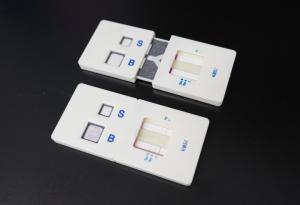![[사진=KBSI]](https://i0.wp.com/cdn.enewstoday.co.kr/news/photo/202103/1460331_518247_4458.jpg?w=560)
[이뉴스투데이 전한울 기자] The Korea Basic Science Institute (KBSI) is a rapid detection kit that allows the research team of Dr. Choi Jong-soon (current vice president) of the Materials Analysis Research Department to detect antibiotic-resistant super bacteria’Clostridioides difficile’ (hereinafter referred to as C. It was announced on the 15th that it has developed.
C. Difficil can cause fever, diarrhea, and abdominal pain when infected with enteric bacteria that cannot be treated with antibiotics. The US Centers for Disease Control and Prevention (CDC) defines C. Difficil as the highest threat level, the’Urgent’ level.
Choi Jong-soon and Do-kyung Han, Ph.D. in the material analysis research department of KBSI and Dr. Joseph Kwon, the biochemical analysis team, developed a highly sensitive multi-analysis technology that quickly detects C.difficile through a joint research with the research team of Professor Dal-Sik Kim of the Department of Diagnostic Laboratory Medicine at Chonbuk National University, and applied it to Developed a multi-detection kit (mPAD).
C. difficile does not yet have a clear treatment, so a quick and accurate early diagnosis is required to block the spread of infection. However, the currently used test method takes a lot of time because it is carried out in three steps, including the C. difficile antigen test, toxin test, and genetic test for the patient’s feces, and the sensitivity of the antigen test and toxin test is very low. It was difficult.
The mPAD developed by the KBSI research team can be detected in 10 minutes with only one analysis, and even a small amount of low-concentration C. difficile samples can be detected in up to 1 hour through high-sensitivity signal amplification. If a fecal sample of a patient suspected of C. difficile infection is dropped onto mPAD, it is possible to simultaneously visually check whether one C. difficile biomarker antigen (GDH) and two toxins (Toxin A, B) are detected.
The KBSI research team created an mPAD with a three-dimensional fluid passage by creating a hydrophilic and hydrophobic pattern on paper through wax printing and stacking it in five layers. If a patient’s fecal sample is dropped into the hole of the mPAD and water is dropped into another hole that has been treated with a reagent to amplify the detection signal, the sample flows first along the fluid path and then the reagent flows. The solutions react to the gold nanoparticles on the surface of the mPAD paper, and the measurement sensitivity is amplified due to the principle that the metal is precipitated, so that distinct color development can be confirmed.
The detection sensitivity of mPAD is 97%, the specificity is 88%, and the accuracy is 95%. It is made of paper, so the manufacturing cost is low and no additional equipment is required, so it has the advantage of being user-friendly.
In this joint study, the KBSI research team performed mPAD design, manufacturing, characterization, and analysis of actual samples of patients through mPAD, and the Chonbuk National University Medical School research team participated in the analysis of actual samples of patients and evaluation of mPAD detection analysis using the current standard analysis method. .
The results of this study were published on the 15th in Biosensors and Bioelectronics, the top academic journal in the field of analytical chemistry, as a result of the KBSI biodisaster analysis technology development project.
Dr. Joseph Kwon, KBSI, said, “This research is a case that suggests the possibility of securing and localizing C. Difficile diagnosis source technology.” “It will be able to replace the test method of the doctor.”
Choi Jong-soon, vice president of KBSI, who oversees the research, said, “The purpose of the KBSI Biodisaster Analysis Technology Development Project is to solve problems directly related to people’s life and safety through advanced analysis technology. Achievements are being drawn,” he said. “We look forward to expanding into research projects that can also prepare countermeasures against novel viruses such as Corona 19 in the future.”
Copyright © Enews Today Unauthorized reproduction and redistribution are prohibited.
